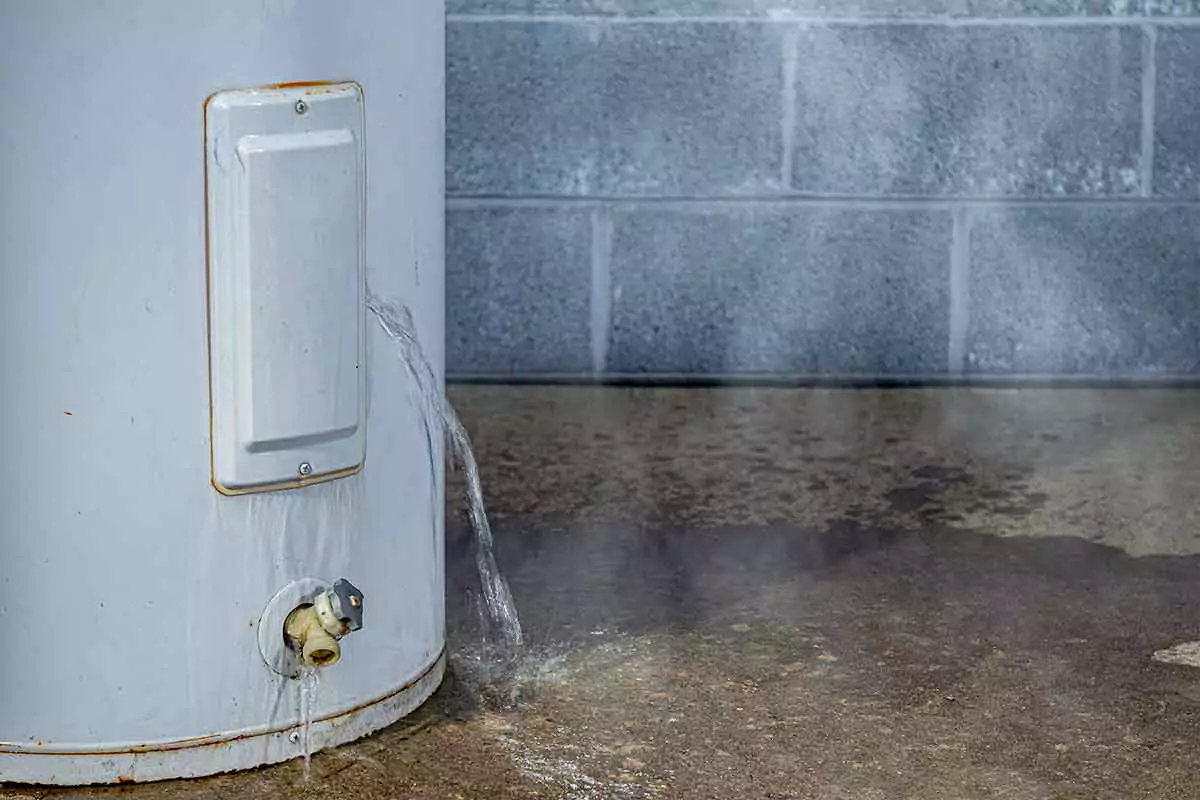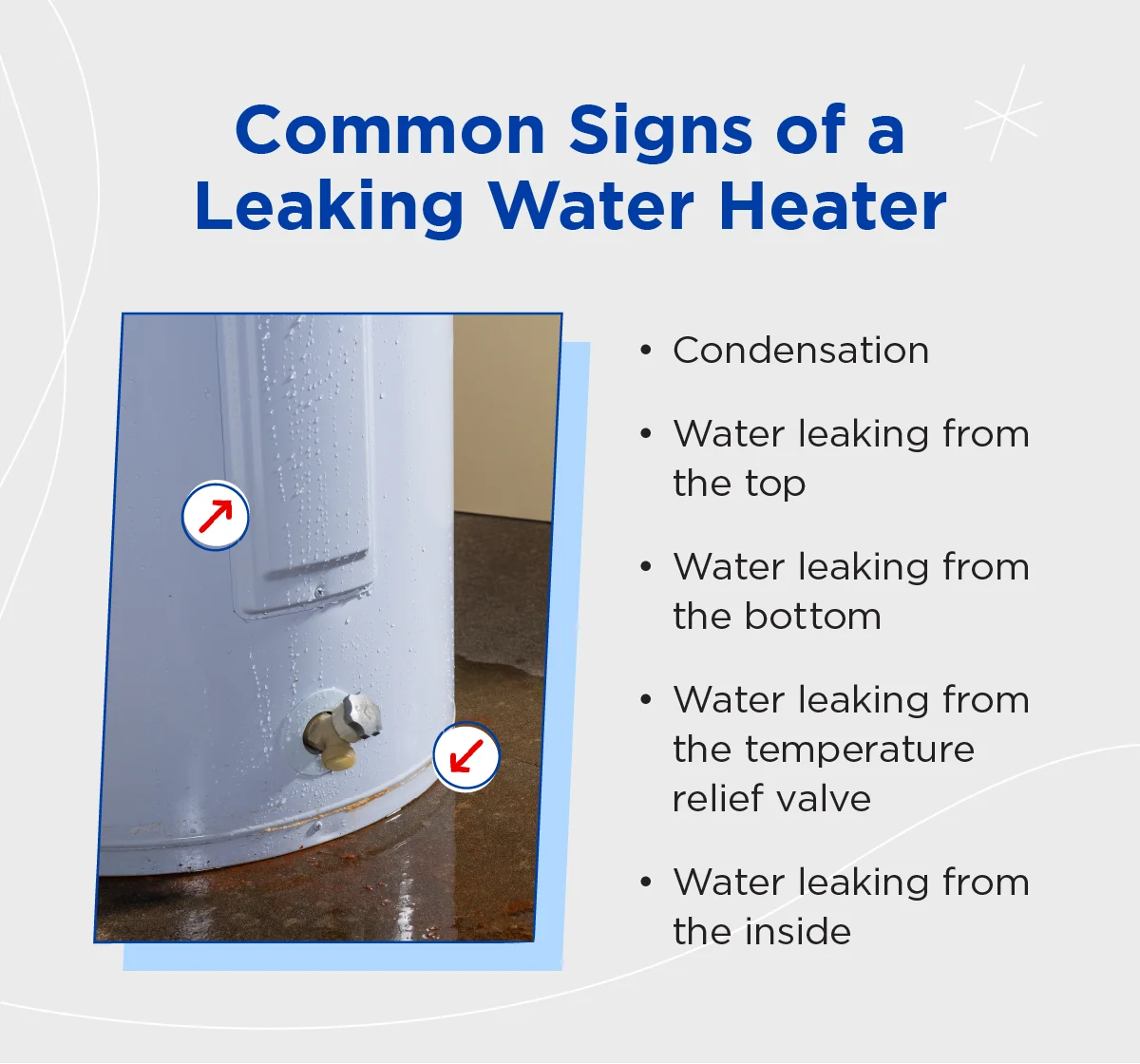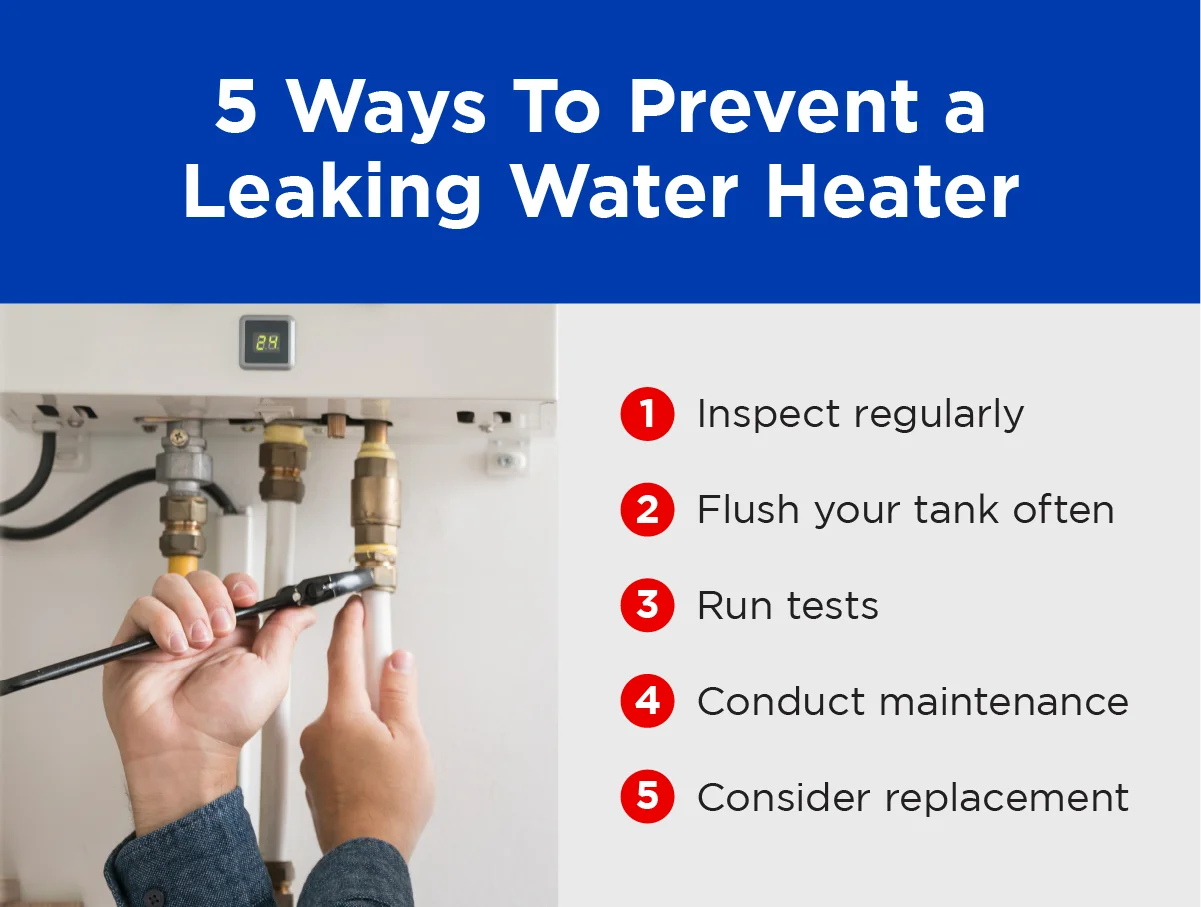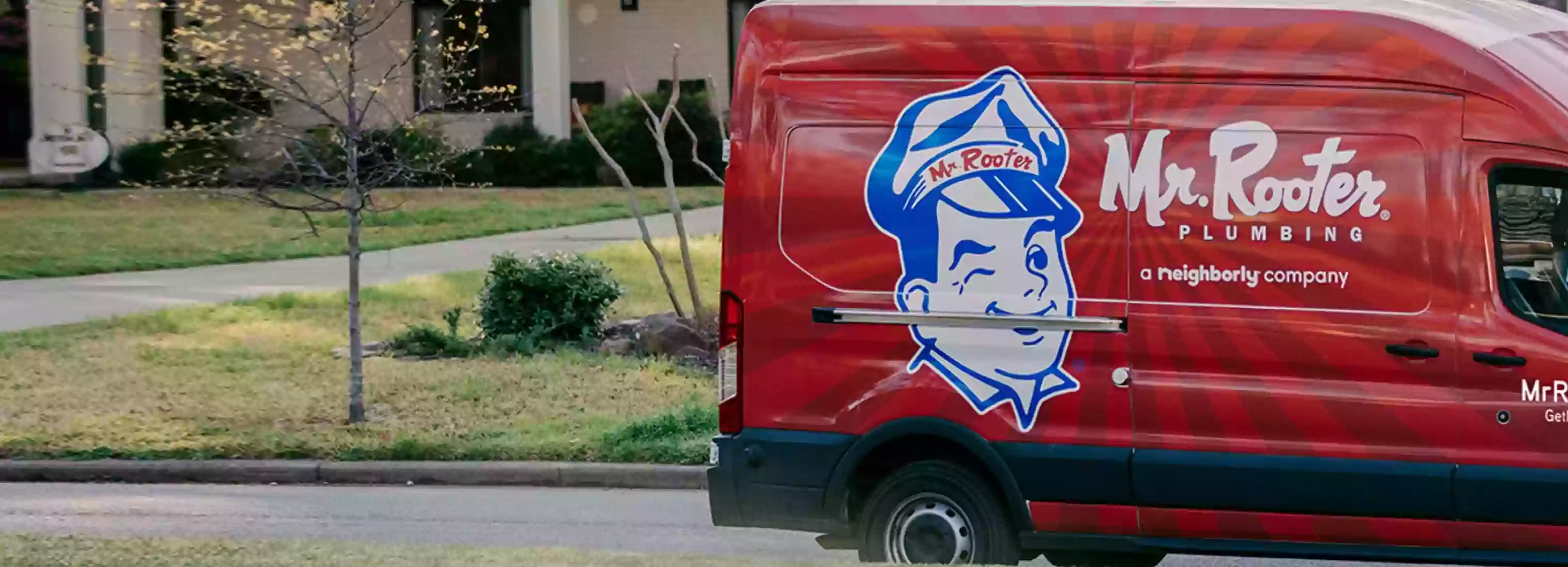How To Prevent a Leaking Water Heater: Common Reasons + Solutions

If you found some unexplained water in your HVAC room or your water heater has been rumbling and slow to deliver the hot water you need for a shower, you’ve likely got a leaking water heater.
We know just how stressful it can be to deal with any water heater problems, so we gathered some tips for troubleshooting your water heater, a list of common water heater problems, and what to do before you have a major problem on your hands.
6 Reasons Your Water Heater May Be Leaking
Most homes get a lot of use out of their water heaters. While they’re designed to handle most of your needs, water heaters don’t last forever. Here are six reasons you may have a leaking water heater:
- Old age: It’s not unheard of for hot water heater tanks that are only six years old to fail. If your water heater is between eight and 12 years old (when most water heaters wear out), you might be better off replacing it instead of trying to repair it. Tankless water heaters, on the other hand, have an expected lifespan of 20 years or more, so if yours is tankless, it may have more years to give you after a repair performed by a service professional.
- Unit efficiency: If you notice your water isn't heating up or it’s running out of hot water too quickly, your water heater may be malfunctioning or not holding heat properly. It’s probably time to replace it, even if the leak is fixable.
- High water pressure: Water heaters are built with a pressure relief valve to help regulate the pressure inside the tank. If the valve fails or isn’t functioning properly, it could lead to pressures that damage other components. This damage could cause a leak.
- Cracks and corrosion: Cracks in a water heater can result from several factors, including manufacturing defects and expansion and contraction. If the anode rod in a water heater wears out, it stops capturing the sediment found in water. Over time, the sediment in your water heater can settle at the bottom of the tank and cause corrosion.
- Loose drain valve: The valve at the bottom of your water heater is designed to let water out so you can service the unit. But if the internal pressure is too high or the valve is faulty, it could start to leak.
- Faulty fittings: If your water heater was installed with old or poor-quality fittings, a leak may develop in those areas. These leaks can occur at the cold water supply or the hot water send, drain valve, water pressure relief valve, or gas valve.
There are other reasons your water heater might start to leak, but these are the most common.
5 Common Signs + Solutions for a Leaking Water Heater

While dripping or standing water are the most common signs of a leaking water heater, they aren’t the only way to tell that your water heater has sprung a leak. Keep your eyes open for these warning signs of a water leak, and find out how to stop them from worsening.
1. Condensation
Condensation on a water heater can look like a leak, but that doesn’t mean there is one. If your water heater is in a poorly insulated area or the water coming into a hot tank is significantly colder, it can lead to condensation.
Filling a new tank for the first time can also cause condensation. You’re also more likely to see condensation during winter and spring.
The fix: Dry the water heater and the area under it. Set the thermostat in the pilot position. Check the water heater every few hours for the next day.
After the interior temperature reaches 110 degrees Fahrenheit, check for water under the water heater. If there is none, it was just condensation. If you see water under the tank, contact a water heater repair expert for help.
2. Water heater leaking from top
If your water heater is leaking from the top, it could be caused by:
- Loose connections to the cold water supply or hot water send
- A broken or damaged pressure relief valve
- A corroded top of the tank
Each of these causes has different solutions, ranging from retightening connections to replacing the entire unit.
The fix: Turn off the power, gas, and water supply to the water heater. Tighten the connections from the cold water supply and hot water send.
Power the water heater back on and see if the leak persists. If you still have a leaky water heater, contact a service professional. You may need to replace your water heater.
3. Water heater leaking from bottom
If your water heater is leaking from the bottom, it may be caused by sediment and mineral buildup corroding the tank. If water is leaking from the drain valve at the bottom of the tank, it could be a sign that the valve is faulty.
The fix: Try draining your water heater. This will help flush out the sediment sitting at the bottom of the tank. Refill the heater and see if the leak has stopped.
If it hasn’t, it likely means that the bottom of your tank is corroded, and the water heater must be replaced. If the drain valve is leaking, it will need to be replaced.
4. Water leaking from the temperature and pressure relief valve
The job of the temperature and pressure relief valve is to release pressure from the tank when the water pressure or temperature is too high.
A leaky pressure relief valve may mean your thermostat is set too high, the water pressure may need to be reduced, or the valve may need to be replaced.
The fix: Water leaking from the pressure relief valve may not be a sign of a leaking water heater — it could mean that your water heater is working correctly but that the temperature (and pressure) in the tank is too high.
Try turning down the temperature. If the valve continues to leak, you may need to replace it.
5. Water leaking from inside
Internal water heater leaks are difficult to detect because you can’t see them just by looking at a water heater and its surroundings.
If you hear dripping or moving water inside the tank, it could mean an internal leak. If your water is heating up slowly or it doesn’t last as long as it used to, that could be another sign of a leak inside the tank.
The fix: If you think you have an internal water heater leak, contact a service professional. They’ll be able to diagnose an internal leak and either repair it or replace the water heater.
How To Prevent a Leaking Water Heater

Some regular maintenance can keep your water heater in good shape and prevent leaks. Here are a few steps you can take to keep your unit leak-free:
- Inspect regularly: Check the unit for leaks once per month or at least once per quarter. Note any standing water, discoloration, or corrosion of components, and listen for drips and banging.
- Flush your tank: Flushing your tank can help reduce buildup that can cause corrosion and lead to leaks. To drain your water heater, start by turning off the tank’s power, gas, and water supply. Let the water inside the tank cool for a few hours, then attach a hose to the drain valve, open the pressure relief and drain valves, and let the water drain into a nearby floor drain or bucket. Then, turn the water supply back on and let the water drain until it’s clear.
- Run tests: To open the pressure relief valve for testing, follow the instructions in the user manual. Make sure to have a bucket ready to catch any water. To test the thermostat, run hot water for a few minutes, then check the temperature with a thermometer.
- Conduct maintenance: Regular maintenance includes flushing the tank, checking the anode rod for corrosion, testing the pressure relief valve, and testing the thermostat. Most water heater maintenance should be conducted yearly. If you don’t have time or don’t feel comfortable doing it yourself, contact a service professional for help maintaining your water heater.
- Consider replacement: If your water heater has been repaired multiple times and is producing less hot water, it may be time to install a new water heater. Installing a tankless water heater is more efficient and less likely to cause major damage if it malfunctions. Maintaining a tankless water heater is also easier because you don’t have a large reservoir tank to deal with.
Get Help With Your Leaking Water Heater With Mr. Rooter Plumbing®
Coming home to find that your water heater has sprung a leak is incredibly stressful. Even if you’ve dutifully maintained and serviced the unit as recommended, there’s no guarantee that it won’t start leaking. But you don’t have to worry.
Request an estimate from Mr. Rooter Plumbing today to discuss repairing or replacing your leaking water heater.
Leaking Water Heater FAQ
Still have questions about what to do if your water heater is leaking? Mr. Rooter Plumbing has answers.
Can a leaking water heater be repaired?
Although a leaky water heater can be repaired, whether it should be depends on the cause of the leak, its severity, and the age of the unit. Frequent repairs and major efficiency problems can end up costing a lot more than just replacing the unit with a new water heater.
Is a leaking water heater an emergency?
A leaking water heater isn’t necessarily an emergency. While a small leak from a drain valve might be unsettling, it doesn’t mean your water heater is about to rupture. If you notice water leaking from your pressure relief valve or the water supply line, turn the water heater off, drain it, and contact a service professional right away.
Can I still use my water heater if it’s leaking?
You can still use a water heater if it’s leaking, but try to minimize usage until you have it checked out by a professional.
What should I do if my water heater is leaking?
If your water heater is leaking, the best thing to do is set up a bucket to catch the water and then contact a water heater repair professional.
How long will a hot water heater last once it starts leaking?
A leaking water heater can last for weeks or months before the leak gets worse or the tank ruptures. In some cases, like with a poorly connected water supply line, a leak won’t cause any lasting damage to the water heater itself.
 Click to call
Click to call


